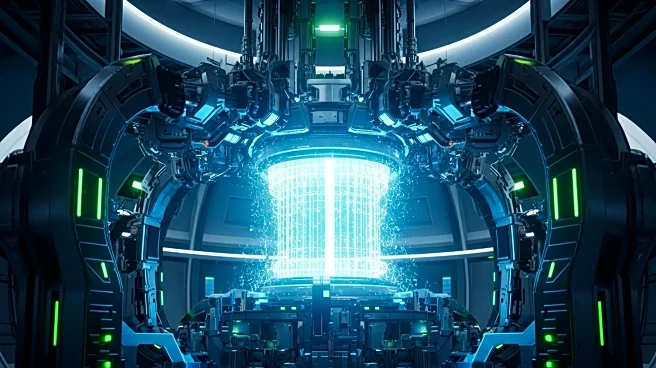What is the story about?
What's Happening?
Commonwealth Fusion Systems (CFS) has entered into a significant agreement with Italian energy company Eni to sell over $1 billion worth of power from its upcoming fusion reactor, Arc. The reactor, which will be located near Richmond, Virginia, is expected to generate 400 megawatts of power and is slated to open in the early 2030s. This deal follows a previous agreement with Google, which plans to purchase half of the reactor's output. The Arc reactor is based on the tokamak design, utilizing superconducting magnets to confine and compress plasma, a process that releases energy. CFS is currently completing its demonstration-scale Sparc reactor in Massachusetts, which is 65% complete and expected to be operational by 2026.
Why It's Important?
The agreement between CFS and Eni marks a pivotal moment in the advancement of fusion energy, a technology that promises to provide a clean and virtually limitless power source. Fusion energy has the potential to significantly impact the energy industry by reducing reliance on fossil fuels and lowering carbon emissions. The deal also highlights the growing interest and investment in fusion technology from major corporations, including Google and Eni. If successful, the Arc reactor could pave the way for more fusion power plants, contributing to energy security and sustainability. However, the high cost and technical challenges associated with fusion energy remain significant hurdles.
What's Next?
CFS plans to complete the Sparc reactor by 2026, which will serve as a testbed for the Arc reactor. The company aims to demonstrate that Sparc can generate more power than needed to sustain fusion reactions. The success of Sparc will be crucial for the future of Arc and subsequent reactors. CFS will continue to engage with financial investors to secure funding for the Arc project, leveraging the power purchase agreements with Google and Eni. The outcome of these efforts will determine the feasibility and timeline for the Arc reactor's construction and operation.
Beyond the Headlines
The development of fusion energy raises important ethical and environmental considerations. While fusion promises a cleaner energy source, the technology's high costs and potential risks must be carefully managed. The collaboration between CFS and major corporations like Google and Eni reflects a broader trend of private sector involvement in energy innovation, which could influence public policy and regulatory frameworks. The success of fusion energy could also shift global energy dynamics, impacting geopolitical relations and economic strategies.















